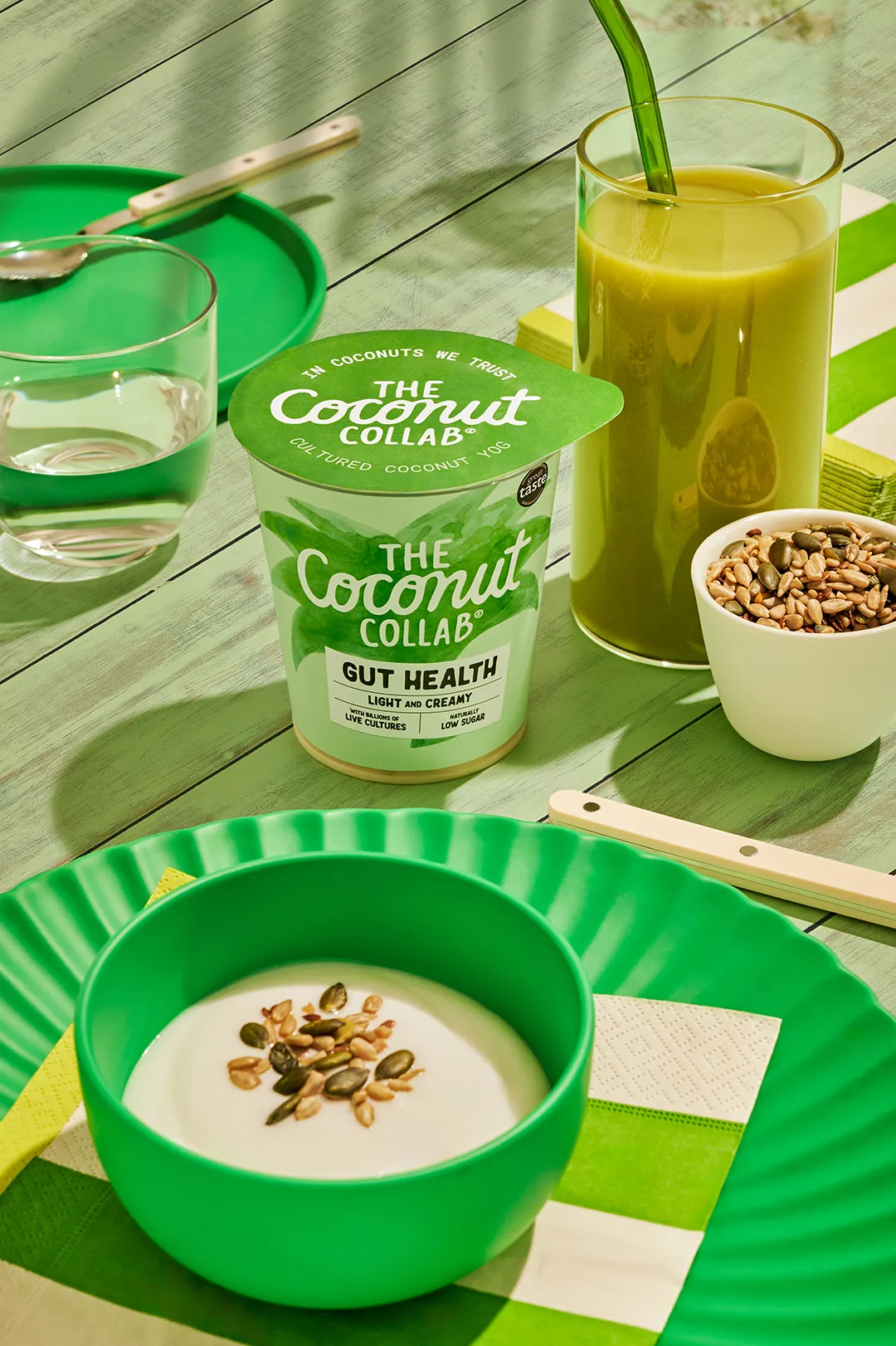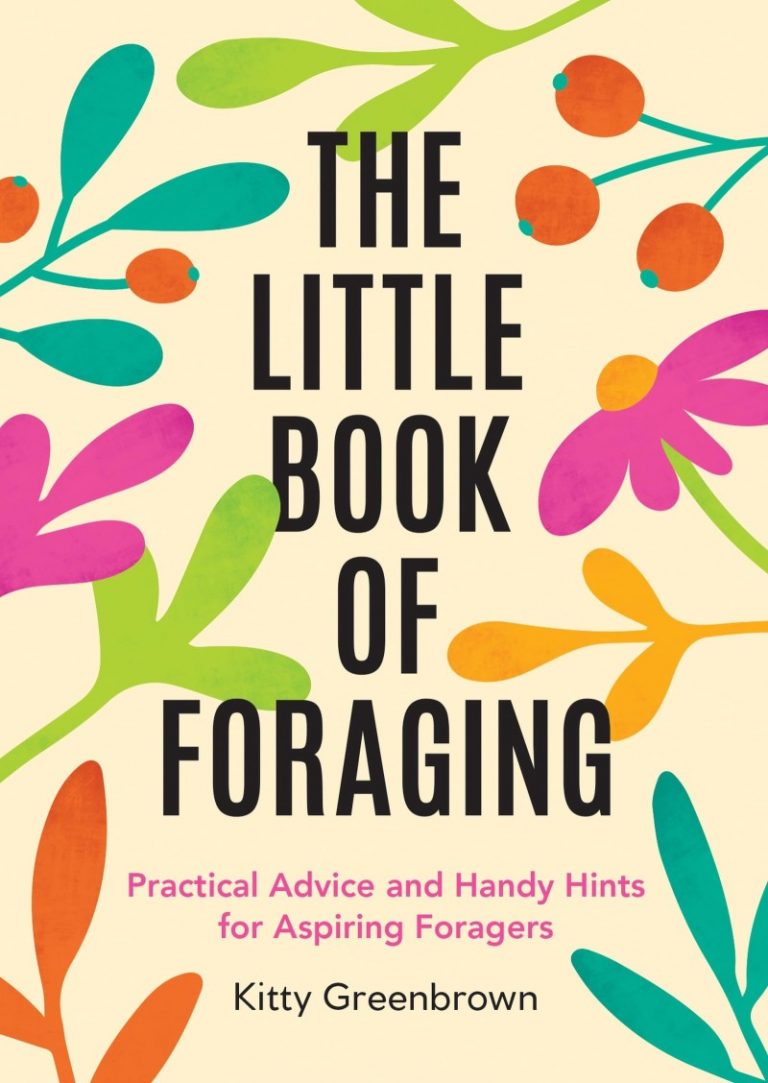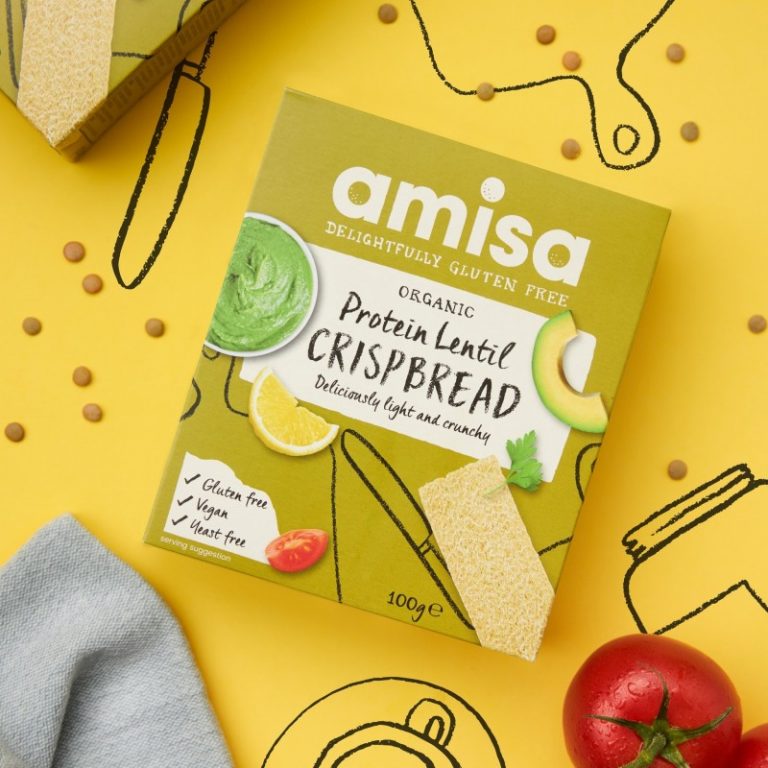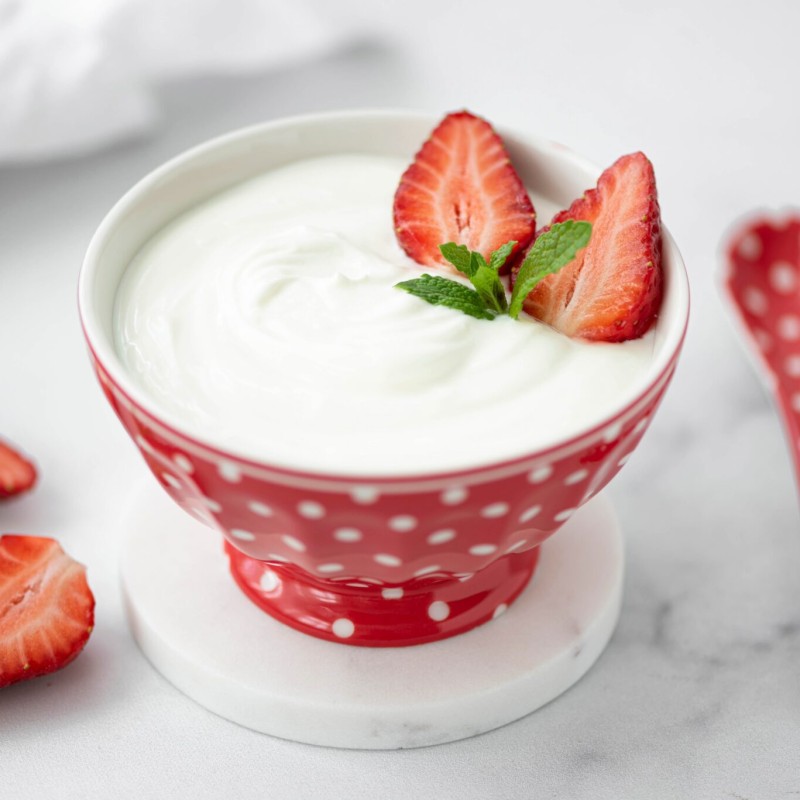
This simple vegan yoghurt recipe (Plant-Based Juniors) can be made with berries or strawberries. The recipe uses blended cashews, read this post on when children can eat nuts.
Plant-Based Yoghurt Recipes and Brands (Guide for 2025)
Plant-based yoghurt has moved from niche to normal in 2025. Supermarkets stock full aisles, cafés swirl it into bowls, and home cooks make jars in their kitchens. The appeal is simple. You get a creamy texture and a tangy taste, close to classic yoghurt, without dairy.
Plant-based yoghurt is made from soy, coconut, almond, oat, or cashew milks that are fermented with live cultures. It suits people who want dairy-free options, whether for health, ethics, or taste. It also works well in smoothies, breakfasts, and dressings. This guide covers why it is a smart choice, brands to try in the UK, and an easy method to make your own at home.
If you want a gentler gut, a lighter footprint, or a satisfying spoonful, you will find a match here. Let’s get into the benefits, then the brands, and finish with a foolproof recipe.
Why Choose Plant-Based Yoghurt Over Dairy?
The switch from dairy yoghurt to plant-based yoghurt brings clear gains for many people. First, digestion. Lactose intolerance is common, and even mild sensitivity can cause bloating or cramps. Plant yoghurts are lactose free, so they tend to sit better. Many options are also low in FODMAPs when chosen plain, which some people with IBS find helpful.
Next, the planet. Plant sources usually need less land and water than dairy herds, and they produce fewer greenhouse gases per serving. Soy and oat have lower impacts than coconut and almond in most analyses, though all plant bases compare well with dairy on emissions. Choosing organic soy or responsibly sourced coconut adds another layer of care.
Ethics also matter. Avoiding animal products aligns with vegan and vegetarian values. Brands often highlight fair supply chains, recyclable pots, or compostable lids. You can match your purchase to your priorities.
Gut health is a key point. Many plant yoghurts contain live cultures, similar to dairy yoghurt. These friendly bacteria, such as Lactobacillus and Bifidobacterium, help balance the gut microbiome. A healthier gut links with better digestion and immune support. You get the same probiotic benefit without animal ingredients.
On nutrition, there is range. Soy yoghurt often offers 7 to 9 grams of protein per 150 g, close to dairy. Almond and coconut are lower in protein but can be rich and satisfying. Oat and soy bring fibre, which dairy yoghurt does not provide. Fortified products add calcium, vitamin D, and B12, which supports a rounded diet. Check labels, choose unsweetened if you prefer less sugar, and tailor to your needs.
A simple swap can pay off. Stir plant yoghurt into porridge, swirl over a curry, or spoon onto fruit. The texture and tang make it an easy stand-in for dairy across meals.
Health Gains from Ditching Dairy
Plant-based eating links with heart health in large cohort studies, thanks to lower saturated fat and higher fibre. Soy yoghurt brings complete protein, and almond or oat yoghurt supports weight goals due to lighter calorie profiles when unsweetened. Some people report less acne or sinus issues when they cut dairy, likely due to reduced inflammation triggers.
Allergy avoidance matters too. If you have a milk allergy, plant yoghurt is a safe route. Soy and almond versions offer protein, without lactose or casein. Choose nut free options like soy or oat if you need to avoid tree nuts.
The Power of Live Cultures in Plant Yoghurts
Live cultures are beneficial bacteria used to ferment plant milks. They convert sugars into lactic acid, which thickens the yoghurt and creates tang. Common strains include Lactobacillus bulgaricus, L. acidophilus, and Bifidobacterium. These strains support digestion and may help with regularity.
Good plant yoghurts match dairy on probiotic content. The key is the label. Look for “live and active cultures” and a list of strains. Avoid pots that have been heat treated after fermentation, since that can reduce bacterial activity. Store chilled, use within the date, and stir well before eating.
Top Plant-Based Yoghurt Brands Worth Trying
The UK market offers strong choices in 2025. Taste and texture vary by base, so pick by preference. Coconut brings rich creaminess, soy leans towards tangy protein, and oat offers mild sweetness.
Here is a quick overview for fast scanning.
| Brand | Base | Standout features | Pros | Cons | Where to buy |
|---|---|---|---|---|---|
| Cocos Organic | Coconut | No added sugars, organic, thick set | Clean label, rich texture, live cultures | Higher price, lower protein | Health stores, Ocado, select supermarkets |
| Sojade Organic | Soy | High protein, organic soy, plain and flavoured | Creamy, good for cooking, often fortified | Soy flavour may be bold for some | Major supermarkets, health stores |
| The Coconut Collab | Coconut | Wide flavours, indulgent style | Fun flavours, smooth and spoonable | Pricier, watch sugar in flavoured pots | Supermarkets, online |
Taste is personal, so try a small pot first. If you like savoury uses, start with plain soy or unsweetened coconut. For dessert bowls, coconut with vanilla or mango works well. Many brands offer multi-packs or mini pots, which helps with sampling.
Cocos Organic: Pure Coconut Delight
Cocos Organic uses 100% coconut milk with no added sugars, and focuses on clean ingredients. The texture is smooth and thick, thanks to the coconut base and careful fermentation. You get live cultures for gut support, and a mild, natural sweetness from the coconut itself. It shines in smoothies, breakfast bowls, or as a topping for spiced lentils. The brand highlights organic certification and often uses recyclable packaging. Expect a premium price for the quality.
Sojade Organic Yoghurts: Taste, Ethics, Nutrition

Plant-based dairy options are no longer a niche. Across England, more people are choosing yoghurt made from plants, not milk, for reasons that span flavour, health, and ethics. Among the brands leading the way, Sojade stands out. This French maker offers organic soya yoghurts that are smooth, satisfying, and kind to the planet.
Sojade keeps things simple. Good ingredients, careful production, and flavours that feel familiar. If you want a yoghurt that supports your goals, whether that means better digestion, a lower carbon footprint, or less plastic, this is a smart place to start.
Read our post on food safety for people and pets.
What Makes Sojade Yoghurts Special?
Sojade is made in France by a company with deep roots in organic food. The brand focuses on responsible sourcing and low-impact production, with a clear eye on taste and texture. You get a yoghurt that is gentle on the stomach, rich in plant protein, and free from lactose.
The soya beans are grown to organic standards. That means no synthetic pesticides and careful crop management. The company buys beans that do not come from cleared rainforest land. This protects habitats and helps keep deforestation-linked emissions out of the supply chain.
Protein and fat are well balanced. Soya yoghurt offers a steady dose of plant protein, a low saturated fat content, and the lift of live cultures from fermentation. Many people who struggle with dairy find soya yoghurt easier to digest.
Packaging matters too. The brand has moved away from unnecessary plastic, with lids and materials chosen to reduce waste. You will often find Sojade on the shelves of independent health food shops, which support small businesses and bring in thoughtful plant-based products.
Sustainable Production and Ethical Sourcing
- Renewable energy: Sojade yoghurts are produced in a French site that uses on-site renewable power, including solar. Cutting fossil energy use reduces the factory’s carbon footprint.
- Organic soya farming: Certified organic fields rebuild soil health and support biodiversity. The supply chain avoids soya tied to rainforest damage. That means no reliance on deforestation hotspots.
- No dairy in the process: Plant-based yoghurt keeps cows out of the equation. That supports better animal welfare, and it reduces methane emissions linked to conventional dairy herds.
Together, these steps create a smaller footprint from field to spoon.
Health Benefits of Soya Yoghurt
Soya yoghurt is more than a dairy swap. It brings a useful set of nutrients and live cultures.
- Protein: Soya offers all essential amino acids in practical amounts per serving. It keeps you fuller for longer and supports muscle repair after exercise.
- Live cultures: Fermentation adds beneficial bacteria. They can support gut balance and help with digestion, especially if lactose upsets your stomach.
- Low saturated fat: Soya yoghurt is low in saturated fat compared to many dairy yoghurts. A lower saturated fat intake supports heart health when combined with a balanced diet.
- Digestibility: No lactose, no problem. Many people find plant-based yoghurt gentler day to day.
For bone health, pair soya yoghurt with calcium-rich foods. Good partners include fortified plant milks, tahini, almonds, or leafy greens.
Exploring Sojade’s Range of Flavours
Sojade is best known for clean, simple flavours that let the yoghurt shine. You can spoon it straight from the pot, stir it into porridge, or use it in savoury recipes. The range stretches from plain and unsweetened to fruit-led pots for easy breakfasts.
Some retailers also stock thicker, strained styles from plant-based makers. These mimic Greek-style or skyr-like textures if you enjoy a denser spoonful. They pair well with cooking and high-protein snacks.
The brand also extends into broader plant-based foods, such as fermented or cultured dairy alternatives, which sit well beside yoghurt in a plant-first kitchen.
Fruit-Infused Soya Yoghurts for Everyday Enjoyment
Fruit flavours bring variety without fuss. The base stays creamy and mild, while the fruit adds brightness.
- Strawberry: Light and fresh, great for children and quick breakfasts. Try it with sliced banana or a sprinkle of oats.
- Blueberry: Known for antioxidants. Works well with toasted seeds or a swirl of almond butter.
- Raspberry: A vivid, tangy note that cuts through granola. Perfect in overnight oats or a simple parfait.
- Cherry: Deeper and richer, with a dessert-like feel. Lovely with dark chocolate shavings or crushed pistachios.
Serving ideas:
- Spoon over granola for crunch.
- Blend into smoothies with frozen fruit and spinach.
- Use as a dessert topper with stewed apples or poached pears.
- Stir into warm porridge for a silky finish.
Labels are clear and simple. Many fruit pots focus on natural ingredients and a short list you can read in seconds.
Creamy Specialties: Greek and Skyr Styles
If you prefer a thick yoghurt, look for strained, Greek-style or skyr-inspired plant options when available. These styles remove more whey during fermentation or straining. The result is a spoon that holds its shape and feels indulgent.
How to use them:
- Greek-style soya yoghurt makes a great base for dips. Fold in garlic, lemon, and herbs for a dairy-free tzatziki effect.
- Skyr-inspired pots are high in protein, which suits gym-goers and anyone trying to manage hunger between meals.
- Both styles work in baking, from muffins to loaf cakes, adding moisture without extra saturated fat.
Want a thicker texture from plain soya yoghurt? Strain it at home through a clean cloth in the fridge for a few hours. You will get a dense, spreadable result that behaves like labneh.
Health, Environment, Compassion
Moving to non-dairy yoghurt is a simple step with a wide ripple. You support your own health with easy-to-digest protein and live cultures. You cut your carbon footprint compared to dairy and reduce reliance on livestock. You also back a supply chain that protects forests and soils, not just profits.
Sojade brings these benefits together. Organic sourcing, renewable energy at the factory, and packaging that avoids needless plastic show a consistent approach. Buying from independent shops keeps money in local communities and rewards stores that curate high-quality plant-based choices.
Supporting Your Health and Wellbeing
- Lower risk of lactose issues: No lactose, so less discomfort for many people.
- Balanced energy: Protein helps steady appetite, so you are less likely to snack on sugary foods.
- Gut support: Live cultures can help maintain a healthy gut environment.
Simple ways to add it to your day:
- Swap dairy yoghurt for soya yoghurt in breakfast bowls.
- Use it as a creamy dressing base with lemon and mustard.
- Stir into soups just before serving for a silky texture.
- Replace cream in curries to lighten the dish without losing richness.
Protecting the Planet and Animals
- Lower water use: Growing soya for yoghurt tends to use less water than producing dairy yoghurt.
- Fewer emissions: Plant-based production avoids methane from dairy herds and supports a smaller carbon footprint.
- No animal exploitation: A plant-only process means better outcomes for cows and calves.
- Packaging progress: Lids and pots are moving toward lower plastic and better recyclability, which reduces waste.
Each pot is a small vote for biodiversity, cleaner energy, and more responsible food systems.
Vegan Camm’vert Cheese!
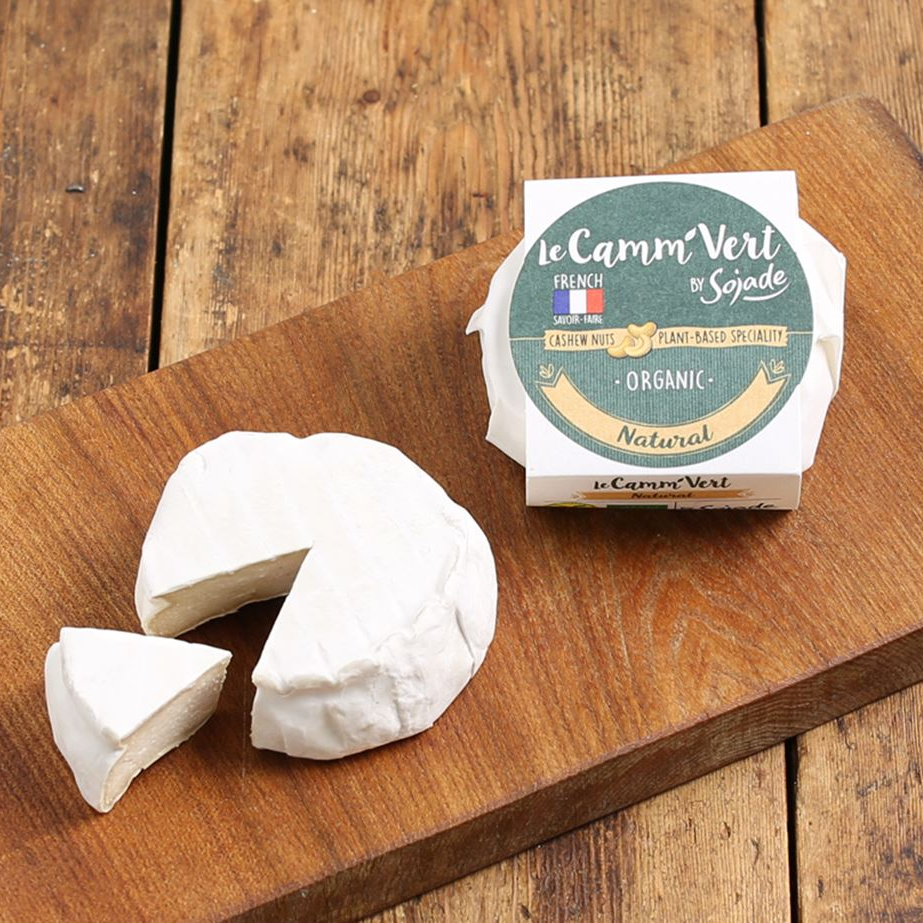
And as a bonus, you can also order optional vegan Camm’vert cheese! (also with sage) that is made with organic cashew nuts, salt and French soya. Delicious with organic chutney and bread, or stir through pasta, or scatter over a seasonal salad. Abel & Cole never air-freights products from abroad, so it’s zero air-miles too!
Conclusion
Sojade organic soya yoghurts bring together three things that matter. Clean, satisfying taste. Careful, lower-impact production. A range that fits daily life, from fruit-forward pots to thicker, strained styles where available. The result is a yoghurt that supports your health and aligns with your values.
Curious to try it? Visit a local independent shop, pick a flavour that suits your mood, and use it in a breakfast bowl or a simple dip. Share what you discover with friends, and swap one dairy product this week for a plant-based choice. Small changes add up, and your spoon can help shape a kinder, cleaner food future.
Sojade Organic: Soy Powerhouse for Everyday Use
Sojade is a dependable soy yoghurt with a creamy mouthfeel and a classic tang. It delivers high protein, which suits active people and meal prep. The range includes plain, vanilla, and fruit flavours, plus unsweetened options. Many pots are fortified with calcium, so they work as a direct dairy swap in cooking or baking. Its neutral profile makes it a good base for savoury dressings and marinades.
Coconut Collab: Fun Flavours from Creative Partners
The Coconut Collab focuses on indulgent coconut yoghurts with playful flavours like vanilla, chocolate, and mango. Packaging is bright, and seasonal or limited editions often appear. The texture is thick and spoonable, which makes it popular with younger shoppers and anyone with a sweet tooth. Quality control is strong, and coconut sourcing is a brand focus. Prices sit at the higher end, so watch for offers in supermarkets or online.
Simple Steps to Make Your Own Plant-Based Yoghurt
Homemade yoghurt is simple and cost effective. You control sweetness, thickness, and cultures. The process is the same across bases: heat, cool, inoculate, incubate, and chill. Soy and coconut tend to set best. Oat can work with a little thickener.
Keep things clean, use pasteurised plant milk, and measure temperatures. If a jar smells off, discard it. Once you have a batch you like, keep a few tablespoons to start the next one.
Ingredients and Tools You Will Need
- 1 litre plant milk, unsweetened and pasteurised
- 2 tablespoons starter yoghurt with live cultures, or a powdered vegan starter
- Thermometer, instant read
- 2 to 4 clean jars with lids
- Incubator, yoghurt maker, warm oven with light on, or a dehydrator
- Optional thickener such as 1 teaspoon agar agar or 2 tablespoons tapioca starch
- Optional flavour add-ins, vanilla paste, lemon zest, or mashed berries
For nut free diets, choose soy, oat, or coconut. For higher protein, go with soy. For extra thick yoghurt, coconut or soy plus a touch of agar works well.
Step-by-Step Recipe Guide
- Heat the milk. Warm 1 litre of plant milk to 82°C, stirring to prevent sticking. This step improves texture and reduces unwanted microbes.
- Cool the milk. Let it drop to 43°C. A cool water bath speeds this up. Skim any skin on the surface.
- Add the starter. Whisk in 2 tablespoons of live culture yoghurt or the directed amount of powdered starter. If using a thickener, whisk it into the milk before heating.
- Incubate. Pour into clean jars, then keep at 40 to 44°C for 6 to 8 hours. A yoghurt maker is easiest. An oven with the light on can work too. Do not disturb the jars during this time.
- Check and chill. When set to your liking, move jars to the fridge for at least 4 hours. The yoghurt will thicken more as it cools.
Tips for thicker yoghurt:
- Use soy or full fat coconut milk.
- Add 1 teaspoon agar to the milk before heating, simmer for 3 minutes to activate.
- Strain finished yoghurt through a fine sieve for a Greek style texture.
Flavour ideas post ferment:
- Vanilla bean: stir in vanilla paste and a touch of maple.
- Berry swirl: fold through crushed raspberries with lemon zest.
- Citrus bright: mix in orange zest and a pinch of cardamom.
Troubleshooting:
- Separation: whisk and chill, or strain to remove excess whey like liquid.
- Too runny: incubate 1 to 2 hours longer next time, or add a small amount of thickener.
- Too sour: reduce incubation time, or chill sooner.

Cocos Organic is one of the better brands of coconut yoghurts in shops, made from ethically-sourced (no monkeys used to harvest) coconuts, all certified vegan and organic, and sold in easy-to-recycle packaging.
Coconuts are of course not locally, but after importing (sorry but you can’t grow coconuts in England!), they are then made in a Kent factory, creating local sustainable jobs.
Most councils now take plastic packaging (if not, recycle at supermarket bag recycling bins).
Avoid nuts for allergies & young children.Read more on food safety for people and pets.
This is a real artisan company, that makes coconuts full of gut-friendly live cultures. Plant-based foods actually absorb calcium better, and strong bones need regular weight-bearing exercise. This is why countries in the Far East that drink little dairy (but walk more) have stronger bones.
Countries that guzzle lots of dairy (the UK, Scandinavia, North America) have far more issues with osteoporosis, as they don’t walk as much, and drink more dairy. Choose from flavours:
- Natural
- Strawberry
- Mixed Berry
- Vanilla
- Mango Passionfruit
You can find these yoghurts in many good delis and farm shops, and some supermarkets.
If you order organic fruit and veg boxes from Abel & Cole (if ordering flowers, read our post on pet-friendly gardens), you can add this company’s Coconut Milk Kefir to your shopping basket.
Why Are People Giving Up Dairy?

The dairy industry is huge. No-one denies that a small organic dairy farmer treats his cows well. But the big dairy industry (from where most dairy milk is produced – especially for all the by-products used in ready-meals etc) has huge welfare concerns.
It’s still the case in the UK that most male calves (of no financial use to the dairy industry, which is separate from the beef industry) are shot dead soon after birth.
Many cows spend their entire lives in factory farms, being inseminated and giving birth, then having their calves ripped from them soon after birth. Cows and calves have incredibly strong relationships, and will cry out loudly for weeks, if separated.
Some organisations are helping dairy farmers to transfarm over to growing more profitable oats, giving seeds and training. Remaining animals are then left to live out their lives in peace, akin to farm sanctuaries.
Sojade (organic soya yoghurts from France)

Fed up with the same-old boring yoghurt brands in supermarkets? Then try Sojade. This brand is only sold in in farm shops and independent health stores, and they are in a different league. They got rid of their plastic lids years ago, and all the yoghurts are made in a solar-powered factory, with organic soya from France.
Before cooking, read our post on food safety for people and pets.
If you can’t find them in local health stores, then ask! If not, then you can buy them online (just click the link above to order from Abel & Cole). The range (which is mostly sold in big tubs) includes:
- Natural (and a Greek yoghurt alternative)
- Skyr (a thick Icelandic yoghurt alternative)
- Blueberry
- Strawberry
- Raspberry
- Blueberry Cherry
Vegan Camm’vert Cheese!

And as a bonus, you can also order optional vegan Camm’vert cheese! (also with sage) that is made with organic cashew nuts, salt and French soya. Delicious with organic chutney and bread, or stir through pasta, or scatter over a seasonal salad. Abel & Cole never air-freights products from abroad, so it’s zero air-miles too!
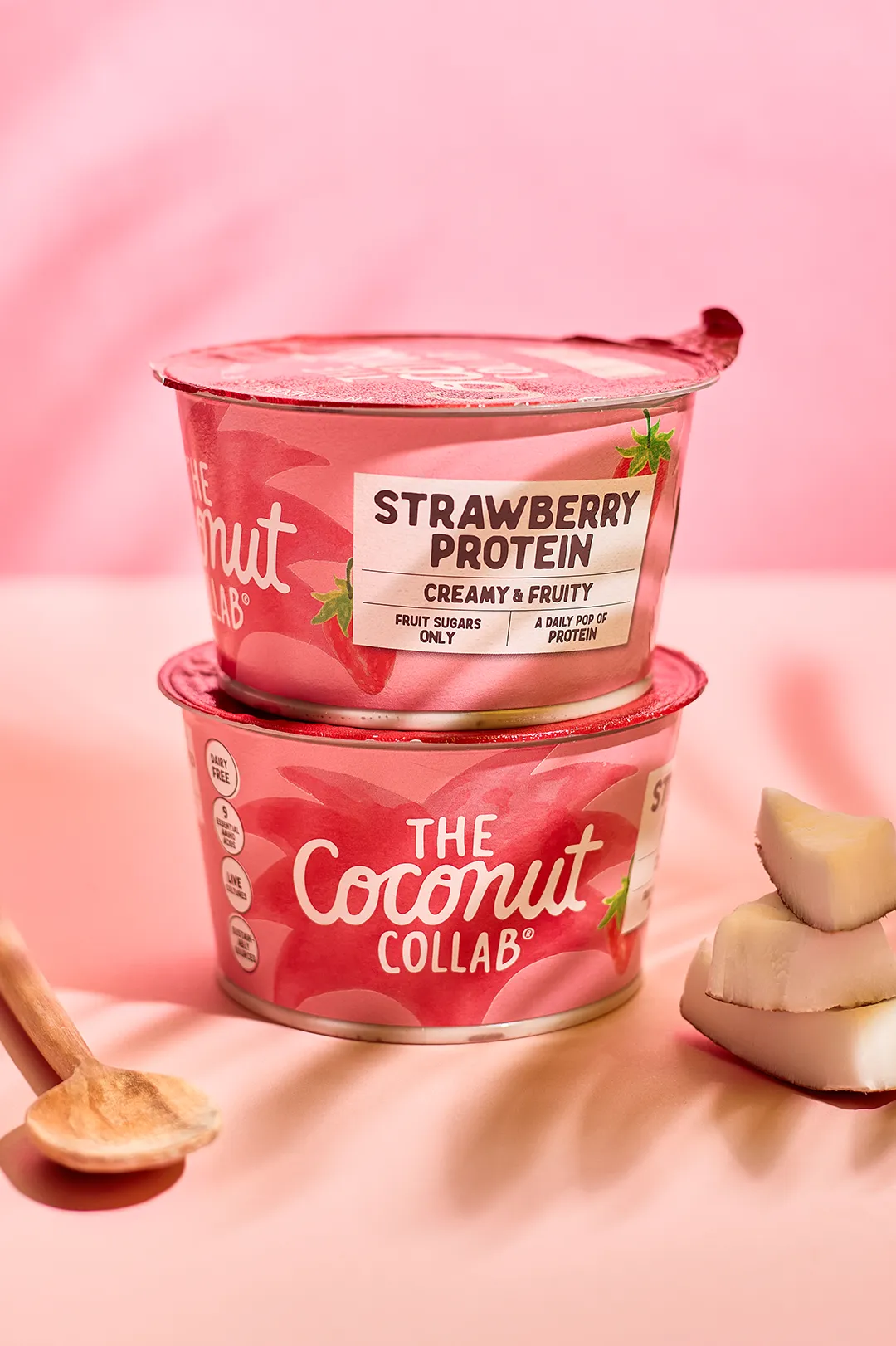
The Coconut Collab offers thick rich coconut yoghurts (along with a lovely ‘double cream’ for strawberries and desserts. In Natural, Strawberry and Raspberry, there is also a Strawberry Protein and a special blend for Gut Health.
